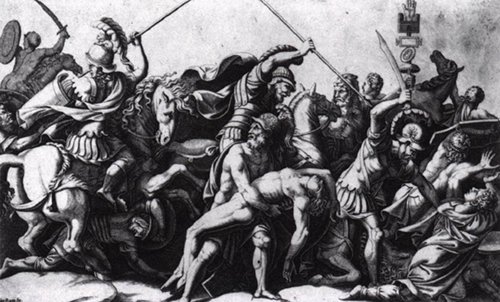
Editor’s Note: This is a guest post by Tony Valdes.
Welcome back to our series on Greek mythology. In the previous posts we established the pantheon of Greek gods and goddesses, the origin stories of humanity, and the heroes that inspired the Greeks. Today, all of that background knowledge will come together in the story of the Trojan War.
Was the Trojan War a Historical Event?
Scholars are uncertain about the historical details of the Trojan War. There is evidence that a city named Troy did exist and that it was ransacked and destroyed by the Greeks, but the proportions of the battle and some of the events described may have been elaborated by Greek authors.
It might help to think of the story we are about to explore to be like Mel Gibson’s film Braveheart. History records that William Wallace was brutally executed by the British after he fought for Scottish freedom on the battlefields of Stirling and Falkirk. Braveheart vividly portrays these facts; however, if we were to further compare the film to Scottish history we would quickly see that Mel Gibson took artistic liberties and embellished the tale of William Wallace. The Greeks likely did the same thing with the heroes and events of the Trojan War.
It is also interesting to note that no single ancient text provides the complete story of the Trojan War; instead, it has been pieced together from several sources, most notably from Homer’s The Iliad and The Odyssey. Another significant chunk of the story comes from the Roman poet Virgil’s The Aeneid as well as plays by Sophocles and Euripides. Some excellent sources that assemble the pieces include Edith Hamilton’s Mythology, Thomas Bulfinch’s Bulfinch’s Mythology, and Robin Waterfield’s The Greek Myths.
Regardless of the tale’s level of accuracy or the number of contributing authors, the Trojan War is one of the most famous stories within Greek mythology, second only to Odysseus’ adventures returning home from it.
How the Olympians Accidentally Started the Trojan War
The story begins with a celebration on Olympus. Understandably, the goddess of discord, Eris, was not invited to the festivities. Bitter about her exclusion, Eris devised a party-crashing gift to spite the Olympians. She inscribed “for the fairest” on a golden apple and tossed it in the midst of the beautiful Olympian goddesses Aphrodite, Athena, and Hera. Of course each goddess felt that she was the fairest and rightfully deserved the apple. The dispute between the three goddesses became so violent that it was brought before Zeus for judgment. Zeus, knowing better than to get in the middle of an argument among women, particularly an argument about who was the most beautiful, told the goddesses that they should allow the dispute to be settled by a mortal man: Paris, the Prince of Troy.
The Judgment of Paris
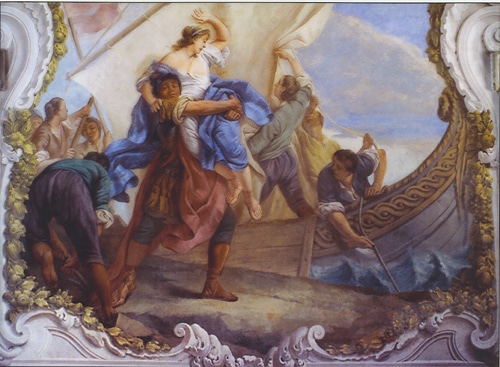
Paris, who was shacked up with a nymph named Oenone, was surprised to have the goddesses appear and give him the honor of choosing the most beautiful. Lacking confidence in their own beauty and knowing the wayward hearts of mortal men, each goddess promised Paris an extravagant bribe. Athena offered Paris victory over the Greeks, who were enemies of the Trojans. Hera offered Paris dominion over all of Europe and Asia. But it was Aphrodite, the goddess of love and beauty, who understood the lustful heart of Paris best: she offered him the most beautiful mortal woman in the world. Though each offer was tempting, Paris chose Aphrodite, thus angering both Athena and Hera.
Unfortunately, the most beautiful woman in the world, Helen, was soon to be married. For years the champions of Greece had begged for the Spartan princess’ hand in marriage. Seeing the potential for disaster, her father shrewdly asked these Grecian heroes to swear an oath to honor and protect whomever he chose to wed his daughter. Once they had done so, Helen’s father named Menelaus as Helen’s lucky husband-to-be and the new king of Sparta.
Helen’s impending marriage was but a minor obstacle for a goddess to overcome, so Aphrodite led Paris to Sparta, where he was welcomed as a guest at the wedding feast despite being a Trojan. As we will see when we explore The Odyssey, the Greeks’ concept of hospitality extended well beyond our own. When Menelaus was called away to business in Crete, Paris betrayed his generous host, took Helen, and fled back to Troy.
It is unclear whether Helen was kidnapped or willingly left with Paris. Waterfield believes that Helen fell in love with him. In contrast, Bulfinch posits that Helen genuinely loved Menelaus but was forced to comply with the will of Aphrodite, thus making Helen an unwilling abductee. Homer’s account in The Odyssey synthesizes these viewpoints: Helen’s dialogue reveals that she genuinely loves Menelaus but also implies that she did at some point also fall for Paris. She goes on to express bewilderment at her own behavior and denounces her foolish, fleeting love for the Trojan.
Regardless of what lay in Helen’s heart, Paris’ actions were intolerably heinous to the Greeks. Aphrodite’s involvement had made Paris too bold: not only had he abducted the bride of the Spartan king, but he had also shown open contempt for the gracious, undeserved hospitality of his enemies. In essence, Paris had sauntered into Sparta and flipped Menelaus the middle finger. The only option left to the Greeks was war.
“The Face That Launched One Thousand Ships”
Menelaus, upon discovering that his wife was gone, was infuriated and called on the Greek champions to fulfill their oath. Menelaus’ brother, Agamemnon, assembled the Greek army. The two most notable warriors to be called were Odysseus and Achilles.
One thousand Greek warships set sail for Troy, thus earning Helen the distinction of being “the face that launched one thousand ships.” King Priam of Troy prepared for battle and appointed his sons, Paris and Hector, to serve as his generals. Despite the hefty heroic roster of the Greeks – Menelaus, Agamemnon, Odysseus, Achilles, Diomedes, and Ajax were all warriors of the highest caliber – they could not gain an advantage over the thick walls of Troy, the leadership of Hector, and a pestilence sent from Apollo.
The Gods Choose Sides
The war lingered for nine years in a stalemate. Eventually, Olympus took notice and intervened. Athena and Hera, still harboring a grudge against Paris, came to the Greeks’ aid along with Poseidon. Aphrodite sided with the Trojans, and Artemis and Apollo did as well. Zeus vowed to remain neutral, but in his heart he favored the Trojans. Now gods fought alongside men and the battle became bloodier than ever.
At the worst possible time, Achilles and Agamemnon found themselves at odds with each other. This was the moment Homer chose to begin his account of the story in The Illiad. I am partial to Robert Fagles translation of the epic’s opening lines:
Rage – Goddess, sing the rage of Peleus’ son Achilles,
murderous, doomed, that cost the Acheans countless losses,
hurling down to the House of Death so many sturdy souls,
great fighters’ souls, but made their bodies carrion,
feasts for the dogs and birds,
and the will of Zeus was moving toward its end.
Begin, Muse, when the two first broke and clashed,
Agamemnon lord of men and Achilles.
Achilles discovered that Chryseis, a Trojan prisoner of war and prophetess of Apollo, was the cause of Apollo’s pestilence on the Greeks and ordered her to be released. Angered by Achilles’ action, Agamemnon countered by taking Achilles’ slave-girl, Briseis. This petty feud caused devastating losses for the Greeks. Achilles refused to fight until Agamemnon returned Briseis to him, and the Greeks could not win the war without their nearly-invulnerable hero.
Paris Versus Menelaus
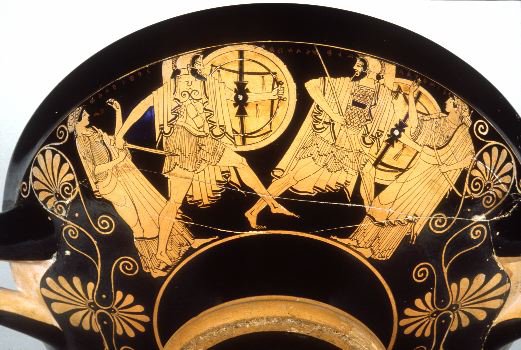
It was at this time that the Trojans and the Greeks came to an agreement. In order to stem the loss of life, Menelaus and Paris would battle one-on-one for Helen. Menelaus, a vicious warrior, was more than a match for Paris, who was weak by comparison. In the midst of the fight, Menelaus’ sword broke in half, perhaps due to the interference of a god. This was a minor setback for Menelaus, however. The brutal Spartan king engaged Paris in hand-to-hand combat, seizing the weak Trojan by the helmet and dragging him around. Had Aphrodite not intervened and cut the strap holding Paris’ helmet, the young Trojan surely would have died at Menelaus’ hands. Free of the Spartan’s death-grip, Paris fled back to the safety of Troy with the help of a cloud provided by Aphrodite.
The honor of the Greeks was once again offended by the cowardice of Paris and blood-lust spread among the soldiers: “Terror and Destruction and Strife, whose fury never slackens, all friends of the murderous War-god, were there to urge men on to slaughter each other.” (Hamilton 266) With a little additional goading from Athena and Hera, the war was back on.
Gods on the Battlefield
Now the battle reached a fever pitch. Hera and Athena joined with the Greek hero Diomedes to battle Ares, who was fighting alongside Hector. The two goddesses guided Diomedes’ spear directly into the chest of Ares, who roared in pain: “The War-god bellowed as loud as ten thousand cry in battle, and at the awful sound trembling seized the whole host, Greeks and Trojans alike.” (Hamilton 267) Ares, whose savage pride could not tolerate an injury from a mere mortal, fled back to Olympus to tend his wound and the battle outside the walls of Troy resumed. Aphrodite, being the least warlike of the gods, also fled to Olympus after she received a minor injury.
To further complicate matters for the Greeks, Achilles’ mother, Thetis, persuaded Zeus to act on behalf of the Trojans to further avenge Achilles’ loss of Briseis. She hoped the war would end before her son could change his mind and return to the fight. Hera would not stand for her husband’s interference, however. She dressed in her most alluring gown and used Aphrodite’s girdle, which rendered the wearer irresistible, to seduce Zeus. While the ruler of Olympus was “preoccupied,” the battle turned in favor of the Greeks.
The Death of Patroclus
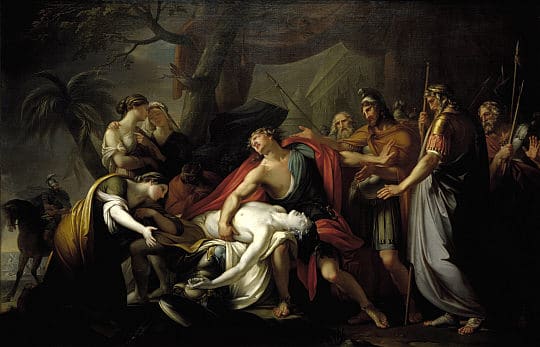
Despite Hera’s timely assistance, Hector was still a troublesome obstacle. It seemed that the home-field advantage was too much for the Greeks to overcome. Furthermore, the Greeks were weary from nine years of fighting to reclaim one man’s wife. When Zeus discovered Hera’s treachery and returned in full-force, even the ambitious Agamemnon, who looked forward to adding Troy to his kingdom, considered retreat.
It was at this bleak moment that Patroclus, the cousin of Achilles, donned Achilles’ armor and went on to the battlefield. Patroclus met Hector in combat and Hector swiftly killed him, thinking that the young man was Achilles. Despite being robbed of such a glorious victory, Hector still relished the death of a formidable opponent and took Achilles’ armor off Patroclus’ body to wear as a trophy.
The following day, the gods of Olympus were in the heat of the battle again. “The gods were now fighting, too, as hotly as the men, and Zeus sitting apart in Olympus laughed pleasantly to himself when he saw god matched against god: Athena felling Ares to the ground; Hera seizing the bow of Artemis from her shoulders and boxing her ears with it this way and that; Poseidon provoking Apollo with taunting words to strike him first.” (Hamilton 273)
The Wrath of Achilles
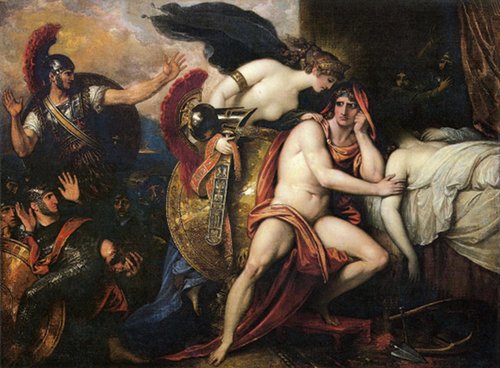
Meanwhile, Thetis reluctantly brought her son replacement armor forged by Hephaestus. With his new armor, Achilles was eager to rejoin the fight and avenge his cousin Patroclus. Hector knew Achilles would be his undoing. In an uncharacteristic act of cowardice, Hector fled from Achilles, who chased the Trojan around the city walls three times before Hector stopped to face him. Knowing that his death was at hand, Hector requested a covenant that the victor would honor the dead body of the defeated, even going so far as to offer Achilles a reward for doing so. In Fagles’ translation Achilles replied:
Would to god my rage, my fury would drive me now
To hack your flesh away and eat you raw –
Such agonies you have caused me! Ransom?
No man alive could keep the dog-packs off you,
Not if they haul in ten, twenty times that ransom
And pile it here before me and promise me fortunes more –
No, not even if Dardan Priam should offer to weigh out
Your bulk in gold! Not even then will your noble mother
Lay you on your deathbed, mourn the son she bore…
The dogs and the birds will rend you – blood and bone!
Achilles then viciously attacked Hector and exploited the weak points in his old armor, which Hector wore. He drove a spear through Hector’s throat, tied the Trojan hero’s ankles together, and dragged the corpse behind his chariot as he rode around the walls of Troy.
Later that night, King Priam boldly entered the Greek camp with the support of the gods, approached Achilles, and requested the return of his son’s mutilated body for burial. Achilles showed sympathy to the aging king and surrendered Hector’s body; the Trojans honored Hector with a funeral pyre behind the city walls the same night.
This is where Homer chose to end The Iliad. Robert Fagles’ translation is 537 pages long without the additional material provided by the publisher, which should give you a clear idea of how much detail Homer includes about this relatively brief portion of the war.
The Death of Achilles

Soon after defeating Hector, Achilles met his own doom. Having battled the Trojans all the way back against their city walls, Achilles felt that victory was near, but also knew his own death would be at hand. It was at this critical moment that Paris shot an arrow, guided by Apollo, directly into Achilles’ heel, killing the otherwise unstoppable Greek warrior. Ajax took the body of Achilles back to the Greek camp while Odysseus and his men held the Trojans at bay.
In the Greek camp, the surviving warriors mourned the loss of Achilles and struggled to decide who would don his mighty Hephaestus-forged armor. Odysseus and Ajax were selected as the most worthy candidates. The remaining Greek heroes took a secret vote, and Odysseus received the armor. Ajax, furious that the armor was not given to him, temporarily went mad, slaughtered a number of livestock, and beat a ram to death with his bare hands; in his delirious fury he believed the ram was Odysseus. When Ajax returned to his right mind, he realized the shame he had brought on himself and chose to commit suicide.
The Death of Paris
Odysseus, eager to return to his wife and son, took matters into his own hands. Capturing a Trojan prophet, he held the man at knife’s point and demanded to know how to defeat the Trojans. The prophet revealed that the Greeks would need Hercules’ bow if they were to secure victory. Odysseus took his men and traveled to find Philoctetes, the keeper of Hercules’ bow. When they returned to the battlefield, Philoctetes used the bow to shoot Paris through the chest. Frightened and dying, Paris cried out to Oenone, the nymph with whom he had been romantically involved prior to receiving his prize from Aphrodite. Oenone refused to heal Paris’ wound and he died. In her grief, Oenone then killed herself.
The Trojan Horse
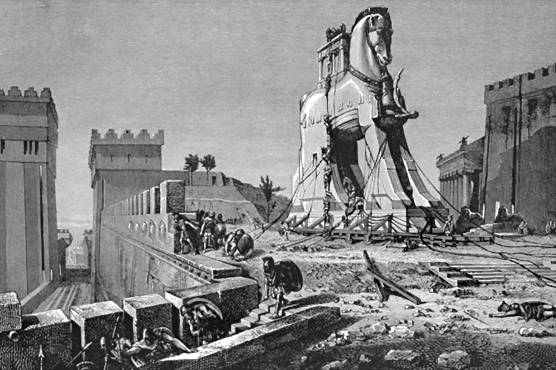
It was now the tenth year of the war. With both Hector and Paris dead, the Greeks had the edge they needed to defeat the Trojans. Once again Odysseus took matters into his own hands. He had his men build a wooden horse with enough hollow space inside to hold Odysseus and several dozen soldiers. Odysseus then told Agamemnon to take the remaining Greek soldiers and sail to a cove out of sight of the Trojan watchtowers.
The following day when the Trojans came on to the battlefield all they found was the large wooden horse and a solitary Greek soldier, who reported that the Greek army had given up and left in the night. In return for sparing his life, he told the Trojans about the mysterious wooden horse. He claimed that the Greeks had built the horse as an offering to Athena in hopes that the suspicious Trojans would destroy it and invoke the wrath of the goddess. The Trojans bought the story and took the horse into the city as part of their victory celebration; inside, wily Odysseus and dozens of his best men crouched, silently waiting for nightfall.
During the course of the celebration, Helen walked past the wooden horse, running her hand along it. The men inside, most of whom had not seen a woman in ten years, were eager to call out to her. Only Odysseus had the self-control to resist, clamping his strong hands over the mouth of his weakest soldier to prevent the man’s lust from revealing their hiding place.
When the Trojans retired for the night, Odysseus and his men sprung into action. They leapt out of their hiding spot inside the horse, killed the watchtower guards, and opened the city gates for the rest of the Greek army (which had left their hiding spot under cover of darkness). The Greeks began to burn down the city. By the time the Trojans woke and saw what was happening, all was lost. The Trojans fought savagely that night; their only concern was killing as many Greeks as possible. A few clever Trojans donned the armor of fallen Greek soldiers to disguise themselves, but it was too little too late. The Greeks had won. The Trojan War was over.
Interestingly, despite the supposed support of Zeus, Artemis, and Apollo, the Olympians did not come to the aid of the Trojans that day. Aphrodite was the only one to act: she helped one of her mortal sons, Aeneas, escape the city and returned Helen to the waiting arms of Menelaus.
Today’s Wrap Up
The Trojan War is a centerpiece of Greek mythology. It is a story of lust, betrayal, courage, ingenuity, and perseverance that few stories can rival. In the final post of this series, we’ll look at Odysseus’ struggle to return home from the Trojan War and consider some ways we can practically apply our basic knowledge of Greek mythology.
Primer on Greek Mythology Series:
The Gods and Goddesses
The Mortal World and Its Heroes
The Trojan War
The Odyssey and Applying What We’ve Learned


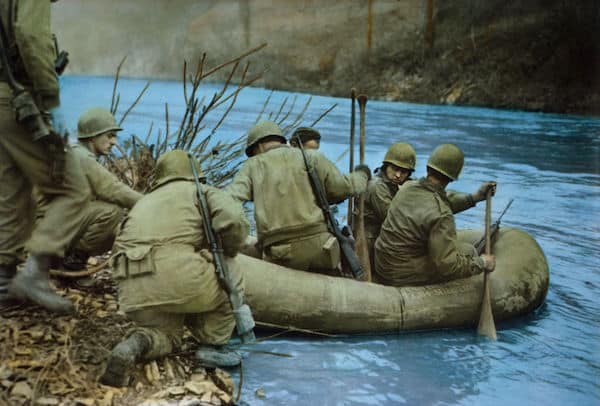


![A drawing of a group of men wearing helmets, inspired by Greek mythology. [Part II]](https://content.artofmanliness.com/uploads/2012/10/gods.jpg)

